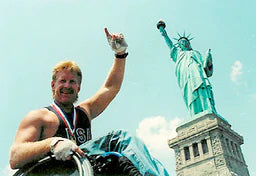When opportunities come your way, go out and meet them head-on with optimism and a vision for success. Even “failure” is an opportunity to learn and improve.
I had my first opportunity to compete against other wheelchair athletes when my brother, Gerald, invited me to visit him in Atlanta, Georgia, and run the annual Peachtree 10K road race. It’s a huge event that draws more than 50,000 runners from around the world every 4th of July. My brother lived close by and had seen wheelchair athletes on the course the year before. He knew that I was starting to get involved in wheelchair athletics, and thought I’d be interested in the challenge of a road race.

He was right. Although I had never participated in a wheelchair race – and didn’t even know they existed – I dropped everything and went to Atlanta for the event. On the morning of the race, I approached the starting line in my standard “hospital-issued” wheelchair and was amazed at what I saw. The other competitors were lining up in sporty wheelchairs that looked more like sleek drag race cars than what I was pushing. They all had special gloves for racing to complement their “fast rides.” But their gear was just one of those things I noticed and put out of my mind…I was just excited to be trying out a new athletic event, and looking forward to the thrill of challenging myself.
Honestly, I didn’t even know how long the course was. I could understand distance in miles but didn’t have a point of reference for how far one kilometer was, let alone 10K (6.2 miles). Plus, I didn’t really know anything about racing in a wheelchair at all. I’d competed in track & field events in high school and college, but only on my feet. I think one of the true secrets to success in whatever you choose to do in life is not being afraid to fail. When I went to the Peachtree road race I had NO FEAR of FAILURE! Of course, racing on wheels would prove to be a whole new game, and I would find that I was totally unprepared. I brought the wrong kind of gloves, had no tape for my hands, and didn’t even have the right kind of clothing for racing! Basically, I showed up at the event without any of the things that I’d consider to be essential today.
Worst of all, though, was that I was planning to complete the course in an old, bulky, clumsy hospital chair. You know the kind – heavy and rigid, built more like a garbage truck than a speedster. When the other competitors saw me, they said, “Hey, you’d better get into your racer…it’s almost time to start.” I had no clue what they were talking about, so I just gave them a blank stare and said, “I’m in it.” They must have thought I was joking because they just laughed.
Finally, it was time to set up at the starting line, which was packed on each side with cheering spectators. The experience was exhilarating. When the starting gun fired, I bore down on my old hospital chair and took off. I poured every ounce of effort into getting a strong start, pumping my arms so furiously that I thought the tires might leave smoke on the pavement. Driven on by the applause, I couldn’t believe how hard I was working, my head down and firing every bit of my intention into my speed. And then I looked up and noticed something that I didn’t expect. The other racers were gone. Long gone. But it didn’t matter…in those first few adrenaline-rush moments, I was hooked.
CARDIAC HILL
Regardless of where I stood in relation to the other racers, I pressed on, loving the feel of speed and uplifted by the supportive crowds lining the course. Because of the lack of adequate hand protection, my palms were blistered by mile four. However, the pain quickly became a secondary concern as I looked up at the next stretch of the course and saw a paved monster. A sign at the base, just off to my right, gave its name: Cardiac Hill. They weren’t kidding. The towering rise before me appeared to be a mile long at about a 45-degree angle, I looked at my hands, and then at that hill again. A thought came to me so strongly that I uttered it out loud: “No way. I can’t make it.”
We all have our own Cardiac Hill at one time or another. It doesn’t matter if it’s in sports, business, or something in your personal life; the feeling is the same. Something happens that makes you feel you can’t get over it, that no effort will tame it. It’s only natural to have those feelings, especially when it seems that everything is out of our control. But we can’t let those thoughts keep us down. At those moments, we all need a little spark, something to spur us on. Where does that motivation come from?
Often, we find strength and purpose just by looking back on the big goals we’ve set and the hard effort that’s already gone into their achievement. If you look back at where you started, you can already see a trajectory that is pointing towards your dreams. Other times, we need encouragement from family, friends, or coworkers – people who are there to help us keep moving forward. Or, we find the motivation from a story like this one, a conversation, or even a memory. It’s not important where we find the strength, only that we allow our confidence and optimism to replace the disempowering thoughts of helplessness in the situation. It may take time, and it may not be easy, but nothing worth achieving usually is.
But everybody gets to the bottom of the hill at one time or another. If you’re in school, it might be a math test, it might be a PE class, it might be something that happens to you on the way to school. You might have something happen to you in life that makes you feel you can’t get over it. Everyone needs a little motivation, a pat on the back, or a hug, or you need to see something or hear something supportive.
| The thick, hard rubber racing gloves Kevin uses today are made specially to “punch” a racing wheelchair push rim in his racing events and in the Fitness 4 ALL 50 State Tour. Kevin went through 4 pairs of gloves before he made it to the finish line! These are the same type of gloves the racers were using at the start of the Peachtree Road Race. |  |
That day, as I stared at Cardiac Hill, my power came suddenly, from something I heard music coming from the side of Cardiac Hill: “Dunh-dunh-ditty-dunh-ditty-dunh-ditty-dunh”! It was the theme song from the movie Rocky! When I hear that music something just comes over me and I feel like I can accomplish anything! I feel like I’m the champion training for the big fight; it reminds me that we can overcome impossible odds. Approaching that hill, I listened to that ROCKY theme until I found a way to WIN!
The next few minutes were among the most agonizing of my life – and that’s saying a lot. My racquetball gloves were shredded, and the bare flesh of my hands was aching and peeling, but I began to methodically push my wheelchair up Cardiac Hill. I fought for each inch, winning them at a painful price. At each turn of the wheel, the sweat and fluid from my broken blisters caused my hands to slip and slide helplessly until I could dry them and try again. The muscles in my arms and back that never trained for this type of effort screamed in protest as I fought on, but I just bit my lip in determination and pain. I felt like I might drown in the sweat and tears flowing down my face, but I couldn’t do anything about it. I was too afraid of losing precious ground to release my grip on the wheels. I pushed hard pounding my racing gloves as fast as I could.
The harder I pushed, the longer the hill seemed to get. The encouraging roar of the crowd lining the hill became like white noise, filling in the background. My entire life narrowed to a spear point, aimed right at the top of that hill. When each push of my wheel was completed, I knew I had to follow it with another painful, methodical, wrenching push, over and over again. The pain stretched into a small eternity until suddenly, the hill was no more. I had reached the top of that concrete beast and now I was fired up ready to push on another mile and cross the finish line.
NO SELF LIMITATIONS when it comes to being successful – Expect more from yourself and be willing to push through the changes, challenges, and obstacles to open the door to success.
Relief washed over me, and then joy. I had just cranked that old, bulky hospital chair over the top! I had beaten Cardiac Hill! For the first time since my accident, I felt a sense of accomplishment and possibility… I was breaking barriers and transcending limitations. And it felt great! That Rocky music was still in my head, now louder now than ever. I felt invincible. I only had about a mile to go to the finish line, and most of it was downhill. Heck, the finish line was in sight!
My elation was short-lived, though. The wheelchair event had begun thirty minutes before the regular race, and the Peachtree 10K, like many road races of its day, had a rule: if a foot runner passes a wheelchair athlete, then the wheelchair athlete must leave the course immediately as a safety precaution. This guideline was there to protect everyone involved, but it was about to crush me.
At the very top of the hill, I had been passed by two of the top foot runners in the world: Craig Virgin (USA) and Kip Keno (Kenya). Unaware of the rule that was about to disqualify me, their appearance only served to excite me further. Here I was, pushing my wheelchair right alongside these Olympic Athletes, the world’s greatest 10,000-meter runners! I was actually cheering them on when reality reared its head. A very large woman wearing a “Race Official” t-shirt came out of nowhere and grabbed me by the shoulder. She took a hold of me and said, “You’ve got to get off the racecourse right now. You’ve been passed by a foot runner. That’s the rule.”
I considered this for a moment and then came to a conclusion: It might have been their rule, but it wasn’t my rule. Barely turning to her, I yelled out, “No way, lady! I’ve come this far and I’m not stopping now!” With that, I pushed loose from her grip and started toward the finish line. I’d come too far to stop, and the excitement of the event had reached a fever pitch. Plus, I’d never quit on anything before in my life. I wasn’t about to start now!
I started punching my wheels again, harder than ever. The gap between myself and the race official was widening. She would never catch me, not with my downhill momentum! A quick glance backward confirmed that she had stopped chasing me. I let out a small laugh as the thought came to me: Whose gonna make it to that finish line now? The reality, however, wasn’t going to give up so easily. I guess that BIG ole lady had some kind of radio communication device on her because she radioed ahead and got four more race officials that looked just like her, all wearing the same “Race Official” t-shirts. This time, they set up a defensive front four, like a human roadblock on Peachtree Street. As I got closer to them, I started pumping my arms as hard as I could. Like my days as a college running back, I could just see myself blasting through that first line of defense and sprinting on past them.
I hit their defensive front as hard as I could and they bent backward but they didn’t break. There was no hole in their line, and they were quickly reinforced with other staff members who were nearby. I still pushed with all my might to keep my wheels spinning, eager to push through and over them to shake their grasp. Unfortunately, the hospital-issued wheelchair proved to be too much of an anchor to allow me to escape that big ole defensive “fearsome foursome” and their “secondary.” While I had admired the racing wheelchairs earlier in the morning, now I was starting to gain a new appreciation for their many benefits. When I was finally tired of the struggle, those four big ladies and their backup physically removed me from the racecourse. At that moment it was more than a defeat; it felt like complete humiliation. I could feel the stares of the spectators who lined the road around me. I heard some of them yell “Good effort!” but I knew from my days of sports on my feet, that those words are only meant to console someone who didn’t succeed.
NEVER BE AFRAID TO FAIL
Perhaps, being so new to racing and so unprepared, I should have expected that outcome. However, I felt that somehow I should have been able to overcome it … after all, the thought of failure was not a deterrent to me. But the humiliation came with a heavy sadness, knowing that I had given it my all and still come up short. It wasn’t just that I didn’t finish, it was that they wouldn’t let me. I’d poured my heart and soul out onto the blacktop that day, but they didn’t care. After they escorted me off the course, I had tears in my eyes. I wheeled myself onto a side street and just sat there. For hours, long after the race had finished, I sat there in silence, taking in the sting. Bet then a new feeling sprang up in me.

Upset as I was, I realized that something in me had changed on Cardiac Hill. I had overcome the pain in my shoulders, my hands, and lungs – and any doubt about my ability to finish – into pure resolve. That moment brought with it another realization: That by going to that race with NO FEAR of FAILURE I had opened the doors to a thrilling, new venue where I knew I could one day succeed. I understood in that second that I needed to take control. Nobody else could live my life for me. So that day I set some goals. The first one was to never let those big ole ladies pull me from that racecourse again. If I was going to get anywhere in life, it was going to be up to me! It was time to take action. So I ordered one of those drag racing chairs and found out how to train to become a top wheelchair athlete.
Kevin pushes hard between 23 and 24 mph. on the flat pavement as he pushes over 2,500 miles across America on the Fitness 4 All 50 State Tour.
The Peachtree road race in Atlanta served as the catalyst that started a new chapter in my life. I vowed right then and there that I would dedicate myself to mastering this new sport to find out just how far I could go. Never again would I be prevented from finishing. I wasn’t going to give anyone else the chance to control my destiny.

That vow would become the seed for so many accomplishments that followed. It powered me through daily training and elite competition against the top wheelchair athletes in the world. And it motivated me to accept and nurture all the opportunities that would come as a result of my athletic success.
Since then, I’ve been very fortunate in competition, winning Gold in World Championships, Paralympics medals in Seoul, Barcelona, and Atlanta, and earning the title of “world’s greatest wheelchair athlete.” Every one of those victories was special to me, but I feel like they all trace back to that moment in Atlanta. It taught me something about life that I try to share with other people. My hill isn’t that different from yours – the adversity, challenges, changes, and obstacles that we face on a daily basis or suddenly appear in our lives. You can’t afford to surrender, because the cost of doing so is nothing less than your goals and dreams. Obstacles, whether they are people, objects, or situations, can always be overcome. There is ALWAYS A WAY when you don’t compromise the standards you set for yourself and NEVER GIVE UP!
But most importantly, “DON’T BE AFRAID TO FAIL” at anything you attempt! Each obstacle is a chance to take a step forward. It only becomes a setback if you don’t persevere. Fear is a natural human emotion in place to protect us from harm, but fear of failure is a crippling state of mind that keeps you from accomplishing great things. It stops you before you’ve even begun, and that’s no way to live life.
Whether we like it or not, adversity is part of life. Overcoming adversity is one of the biggest hurdles we face. As Havelock Ellis wrote, “Pain and death are part of life. To reject them is to reject life itself.” Problems, large and small, present themselves to us throughout our whole existence. Regardless of how sharp, clever, or happy-go-lucky we are, we will encounter struggle, challenges, difficulties, and at times, heart-wrenching moments.
Is this meant to be a negative, cynical assessment of what we have to look forward to?
Not at all!
In fact, thank goodness for adversity! Learning to deal with and overcome adversity is what makes us who we are. Every challenge and every difficulty we successfully confront in life serves to strengthen our will, confidence, and ability to conquer future obstacles. Herodotus, the Greek philosopher, said, “Adversity has the effect of drawing out strength and qualities of a man that would have lain dormant in its absence.” When you respond positively and constructively to your biggest challenges, the qualities of strength, courage, character, and perseverance emerge from deep inside of you.
Of course, since we are human, it is very easy to get caught up in the self-pity, unfairness of life, or ‘why me?’ trap. When we do, we fail to recognize the opportunities for wisdom and growth that accompany adversity. However, as soon we allow ourselves to think more clearly, we are able to let go of self-defeating and unproductive thoughts and get down to the business of dealing with what’s before us.
TIPS TO HELP OVERCOME ADVERSITY:
1. Be aware of, and accept that adversity is inevitable in life.
As has already been pointed out, adversity is part of life. To avoid or resist it will only make it persist. Everywhere you look in the world there is an unmistakable struggle. There are floods, tsunamis, wars, and calamities of all types. Even within your own circle of family and friends, there is death, loss, and tragedy. Although pain is inevitable, suffering is optional. So what do you do?
2. Build your internal resources.
Before adversity hits, work on cultivating emotional strength, courage, and discipline. When you make yourself aware that certain difficulties are inevitable, you can prepare yourself mentally for confronting adversity head-on. It would be no different than a warrior going to battle. He (or she) prepares physically and mentally for any possibility. He knows it could be ugly, daunting, and grueling, but he is equipped. More often than not, when you’re prepared for the worst, the worst never happens, or it’s much less severe than anticipated. Another invaluable inner resource is faith. Faith that everything will work out; faith that there is always light at the end of the tunnel, and faith that “this too shall pass.” Everything in life has its place and purpose.
3. Build a support system of family and friends.
When the going gets tough, we all need encouragement and support. We need someone to talk to; someone to help ease the burden. You would be surprised to discover how often a friend has had a similar experience and can help guide you through a difficult time. Even just knowing a friend is there when you need them can be most comforting.

4. That which does not kill you doesn’t always make you stronger.
Sorry, Nietzsche! While I agree with Nietzsche, in principle – “that what does not kill you will make you stronger”, like the grain elevator explosion that threw me over a two-story, if you do not have enough built-up resilience or experience in dealing with difficulty, adversity can crush you. On the other hand, if do you have sufficient resilience, then indeed it will make you stronger. How so, you ask? Resilience like any muscle is built up gradually and exponentially with repeated exposure to obstacles. If you lack practice in confronting obstacles (as when you choose to avoid them), one traumatic event can take you down.
To underscore this point, developmental research has shown that traumatized children are more, rather than less, likely to be traumatized again. Likewise, those who grow up in tough neighborhoods become weaker, not stronger, and are more likely to struggle in life.
5. Take inspiration and learn from others who have dealt successfully with adversity.
There are many inspiring stories of people who overcame seemingly insurmountable odds. They triumphed over their adversities to live successful, productive lives instead of surrendering to it.
Here are some examples of some people who overcame extraordinary adversity.
Helen Keller: Lost her sight and hearing due to a mysterious fever when she was only 18 months old. She overcame her deafness and blindness to become a strong, educated woman who spoke about, and promoted, women’s rights.
Winston Churchill: Overcame a stuttering problem and poor performance in school to become Prime Minister of the United Kingdom and one of the most influential political leaders of the twentieth century. He was also known for his powerful and rousing speeches.
Wilma Rudolph: This Olympian was born prematurely, on the 20th of 22 children. She overcame double pneumonia, scarlet fever, and polio to become a winner of three Gold medals in track at the 1960 Rome Olympic Games.
W. Mitchell: Undefeated by a blazing motorcycle accident and a paralyzing plane crash, Mitchell learned to take responsibility for the countless changes in his life. Based on his real-life experiences and the remarkable achievements that followed his accidents, worldwide organizations now seek his insight and proven strategies.
Bethany Hamilton: is an American professional surfer who survived a 2003 shark attack in which her left arm was bitten off, but ultimately returned to—and was victorious in—professional surfing.
Bob Dole: Recognized as one of the most prominent political figures of our time with a distinguished record of service, Bob Dole continues to make a difference in the lives of the American people. Known for his unconventional candor and prairie wit, Senator Bob Dole is a unique individual, especially in Washington. As a renowned political commentator, a frequent guest on late-night talk shows, star of two Super Bowl commercials, and best-selling author, Bob Dole is part of the American landscape. Senator Dole’s best-selling World War II memoir, One Soldier’s Story, chronicles his harrowing experience on and off the battlefield and the lessons learned through his struggle to survive. One Soldier’s Story is a tribute to those who defended liberty in its darkest hour and his gift to future generations, a destined-to-be classic about overcoming adversity and making the most out of life.
Points to Consider
• The difficult times in life help all of us appreciate when things are going smoothly.
• Look for learning opportunities in every adverse situation.
• Decide whether you will allow your experience to make, or break you. Depending upon how you choose to perceive it.
• Be prepared to accept the worst, should it occur. When you have prepared yourself mentally for the worst, it rarely ever happens, and if it does, it seems less because you are better equipped to handle it.
• Cultivate faith, courage, resilience, determination, dedication, perseverance and adopt a NEVER GIVE UP attitude. A Never Give Up attitude that will not allow you to fail. The more of these qualities you can incorporate with what you do, the lesser the impact of the adversity.
• Remind yourself that adversity is part of life. To Accept adversity, and use the tools that best help you overcome it.
• Overcoming adversity is one of our main challenges in life. When we resolve to confront and overcome it, we become experts at dealing with it and consequently triumph over our day-to-day struggles.
PROVEN WAYS TO OVERCOME ADVERSITY:
Does it seem like every challenge that you experience becomes a big headache in your life?
No matter what adverse events you are currently experiencing, there is a purpose behind each one. For most of us, it’s difficult to imagine that losing a child or finding out that you have cancer is a blessing. I know from personal experience of being involved in that terrible accident that left me paralyzed from the chest down confined to a wheelchair you can overcome adversity that stands in your way!
Here are four proven ways to overcome adversity:
1. Surround yourself with positive people.
Be selective with the people you surround yourself with. Indirectly they will affect your mood and your outlook. When you are in an emotional state of mind, it’s important to surround yourself with people who are supportive and encouraging. Human beings conform to those around them. Conformity is the change of behavior caused by another person or group of people. When experiencing adversity, it’s crucial in your development to surround yourself with people who are accepting of your flaws, mistakes, and imperfections. Overcoming adversity can be a challenge; when you have a supportive team helping you move forward, it’s much easier to accept yourself.

Kevin always tries to be working out with friends who challenge him [on left] With the U.S. President’s, Governors, and movie stars to encourage him to raise his goals and expectations [middle] And the children who think anything and everything is possible this also challenges him to stay young at heart.
Kevin always tries to be working out with friends who challenge him [on left] With the U.S. President’s, Governors, and movie stars to encourage him to raise his goals and expectations [middle] And the children who think anything and everything is possible this also challenges him to stay young at heart.
2. Write.
There is something so peaceful in writing down your thoughts. However short or long your journal entries are, the process of writing down your emotions allows you to reflect. There are many benefits to writing:
•Allows for self-expression
•Helps give feedback about your life
•Allows you to better understand your current situation
•Allows you to think outside the box
•Makes you a better philosopher
Writing in a journal once a day can help you overcome adversity. Whatever emotions, feelings or thoughts come to mind, jot it down. Years from now you’ll be able to reflect and see just how much you have developed.
Editor’s Note: Kevin has kept daily journals since he started training and speaking about everything he does. From everything he eats how much and what time to the distance and speeds he runs to the amount of time a weight workout takes and what different types of strength exercises and how many reps he performed take him. Then he also records his goals and dreams and what he is doing to move towards them.
3. Be in nature.
Nature is very therapeutic. Living in a society where we are constantly moving around, we are disconnected from the beauty of nature. Whether it be walking in the park or gardening at home, taking the time to connect yourself with nature is a very healing process. There have been more than 100 research studies that have shown that outdoor activities reduce the level of stress. With adversity comes stress and frustration. Taking the time to be outside is a way for you to nurture your being and allow yourself to take a deep breath and relax. The sun and the air give you a sense of calmness in the face of adversity. Take about 10-20 minutes outside each day and find your stress level decreasing.
4. Start investing in yourself.
There is no greater investment than the investment within your own personal development. Experiencing adversity is a great excuse for people not to take charge of their lives. We all face adversity in some way. What makes one individual succeed and another not is how they handle their adversity. Many of us allow challenges to defeat us. What we need to focus on is developing into a stronger and wiser individual because of the challenges. There is no better way to do so than to develop your internal world. Get yourself a library card and start reading self-help books. Take a look at the audio section and find yourself a few audio programs that you would like to listen to in the car. It’s about starting that momentum moving forward rather than backward.

A collage of the end result of Kevin investing in himself in order to be one of the greatest wheelchair athletes in the world. The Peachtree race served as the catalyst where Kevin set his goals to become the “world’s greatest wheelchair athlete” and many more accomplishments.
YOUR ADVERSITY IS A BLESSING IN DISGUISE
You may not think so at the moment, but adversity will eventually make you stronger and wiser. This is true even for people like me who may get injured badly or have other people who have to overcome everyday feelings such as getting out of bed or keeping your mind in the muscles you are exercising while keeping them isolated.
God’s Speed,

Please Let Us Know If You Enjoyed This Article.
Your Feedback Is Important To Us
Disclaimer: This content is for informational purposes only and is not meant as medical advice, nor is it to diagnose or treat any medical condition. Please consult your physician before starting or changing your diet or exercise program. Any use of this information is at the sole discretion and responsibility of the user.













